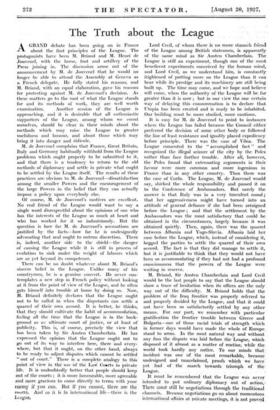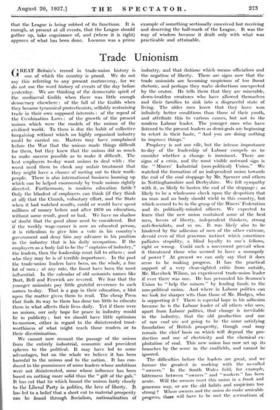The Truth about the League
AGRAND debate has been going on in France about the first principles of the League. The protagonists have been M. Briand and M. Henri de Jouvenel, with the horse, foot and artillery of the Press joining in. The discussion arose out of the announcement by M. de Jouvenel that he would no longer be able to attend the Assembly at Geneva as a French delegate: He fully stated his reasons, and M. Briand, with an equal elaboration, gave his reasons for protesting against M. de Jouvenel's decision. As these. matters go to the root of what the League stands for and its methods of work, they are well worth examination. Another session of the League is approaching, and it is desirable that all enthusiastic supporters of the League, among whom we count ourselves, should be clear in their mindS about the methods which may raise the League to greater usefulness and honour, and about those which may bring it into danger and ridicule.
M. de Jouvenel complains that France, Great Britain, Italy and Germany habitually withhold from the League problems which ought properly to be submitted to it, and that there is a tendency to return to the old methods of diplomacy and settle in private what ought to be settled by the League itself. The results of these practices are obvious to M. de Jouvenel—dissatisfaction among the smaller Powers and the encouragement of the large Powers in the belief that they can actually impose' a .policy upon everybody else.
Of course, M. de JouvenePs motives are excellent. No real friend of the League would want to say a single word disrespectful about the opinions of one who has the interests of the League so much at heart and who has worked for it so industriously. But the question is how far M. de Jouvenel's accusations are justified by the facts—how far he is undesignedly advocating that zeal ought to outrun discretion. There is, indeed, another side to the shield—the danger of causing the League while it is still in process of evolution to sink under the weight of labours which are as yet beyond its competence.
There can be no doubt whatever about M. Briand's sincere belief in the League. Unlike many of his. countrymen, he is a genuine convert. He never .con- templates a new step in French policy without looking at it from the point of view of the League, and he often gets himself into trouble at home by doing so. Now, M. Briand definitely declares that the teague ought not to be called in when the disputants can settle a quarrel of their own accord. It is better, he thinks, that they should cultivate the habit of accommodation, feeling all the time that the League is in the back- ground as a'4. ultimate court of justice, or at least of publicity. This is, of course, precisely the view that has been taken by Sir Austen Chamberlain. He has expressed the opinion that the League ought not to go out of its way to interfere here, there and every; where, but that it ought, on the other hand, always. to be ready to adjust disputes which cannot be settled " out of court." There is a 'complete analogy- to this' point of view in the use of the Law Courts in private life. It is undoubtedly better that pcoiile -should- keep out of the courts ; it is more honourable, more agreeable and more gracious to come directly to terms with your the carats. if you eau, But If you cannot, there are the mats. And Go it Is In international life—there is the Lcague. Lord Cecil, of whom there is no more staunch friend of the League among British statesmen, is apparently of the same mind as Sir Austen Chamberlain. The League is still an experiment, though one of the most beneficent experiments conceived by the human mind, and Lord Cecil, as we understand him,_ is constantly_ frightened of putting more:on the League than it eau bear while its prestige and its machinery are still being, built up. The time may come, and we hope and believe will come, when the authority of the League will be_ far greater than it is now ; but in our view the one certain way of delaying this consummation is to declare that Utopia has been created and is ready to be inhabited. Our building must be more studied, more cautious.
It is easy for M. de Jouvenel to point to instances where the League has failed because the Council either preferred the decision. of some other body or followed the line of least resistance and ignobly placed expediency before principle. There was the case of Vilna. The League consented to the " accomplished fact " and recognized the illegal seizure of the city by the Poles rather than face further trouble. After all, however, the Poles found that extenuating arguments in their favour were more common and more ingenious in France than in any other country. Then there was the case of Corfu. The League, M. de Jouvenel would say, shirked the whole responsibility and passed it on to the Conference of Ambassadors. But surely the answer is that Italy was in a very truculent mood ; that her aggressiveness might have turned into an attitude of general defiance if she had been arraigned before the League ; and that the settlement by the Ambassadors was the most satisfactory that could be obtained in the circumstances, largely because it was obtained quietly. Then, again, there was the quarrel between Albania and Yugo-Slavia. Albania laid her case before the League, which, instead of considering it; begged the parties to settle the quarrel of their own. accord. The fact is that they did manage to settle it, but it is justifiable to think that they would not have been. so accommodating if they had not had a profound. consciousness that the powers of the League were waiting in reserve. • M. Briand, Sir Austen Chamberlain and Lord Cecil would be the last people to say that the League should- show a trace of hesitation when its offices are the only way. out of, the difficulty. M. Briand holds that the problem of the Iraq frontier was properly referred to and properly decided by_ the League, and that it could not have been so satisfactorily settled by any other means. For our part, we remember with particular gratification the frontier trouble between Greece and Bulgaria7-one of those racial trials of strength which in former days would have made the whole of Europe, stand to arms. In the most natural way and without any fuss the dispute was laid before the League,. whick disposed of it almost as a matter of routine; while the: world took . hardly . any notice. To our minds that incident was one :of_ the most remarkable, because undesigned and Unacelaimedi. proofs which we have yet :.had of the . march towards triumph, of the" It. must be remembered that the League Was never: intended .to , put ordinary . diplomacy out of action,' There must still be negotiations through, the. traditional channels, Because negotiations go on about momentous internationalaffairs at private meetings, it *not prove_ that the League is being robbed of its functions. It is enough, at present at all events, that the League should gather up, take cognizance of, and (where it is right) approve of .what has been done. Locarno was a prime example of something sectionally conceived but receiving and deserving the hall-mark of the League. It was the way of wisdom because it dealt only with what was practicable and attainable.



































 Previous page
Previous page